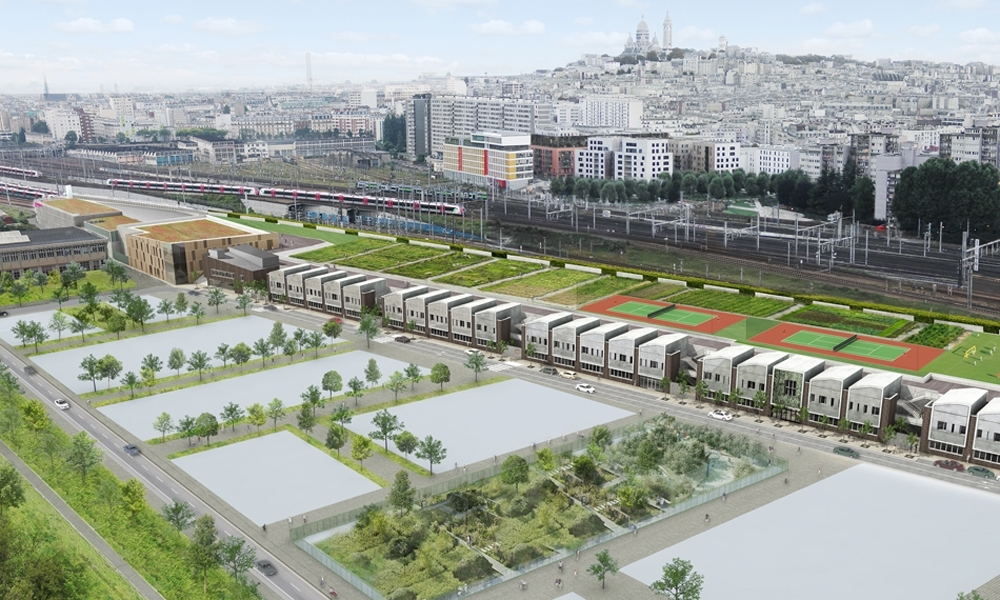Logistics hotels: dream or reality?
 Hosting urban logistics in large cities requires finding new spaces that are accessible but also well integrated into the urban fabric. The logistics hotel provides a different response. The latest emblematic examples show that we are at the beginning of a story. Decoding...
Hosting urban logistics in large cities requires finding new spaces that are accessible but also well integrated into the urban fabric. The logistics hotel provides a different response. The latest emblematic examples show that we are at the beginning of a story. Decoding...The deployment of urban logistics solutions in major cities requires the mobilisation of land to accommodate companies.
There are many reasons for this. The legitimate desire to reduce the number of delivery vehicles in city centres, to restrict time slots and to deliver in carbon-free modes makes it necessary to provide cross-dock spaces to better consolidate flows. These sites must be easily accessible by mass transport (HGVs, river and possibly rail) and well located in relation to the supply routes. They must also allow for easy access to a delivery area by soft modes, such as cycling.
Another reason for the growing need for logistics space in cities is the acceleration of flows. Faster deliveries mean that stocks have to be brought closer together. This concerns food consumption flows but also many B-to-B flows such as industrial spare parts.
Logistics real estate meets other functions such as relay points allowing consumers or companies to pick up and drop off goods within a local radius.
Integrating logistics into the city
In the past, logistics was very present in the heart of cities. Large areas of land, such as Porte de la Chapelle or Bercy, were dedicated to these activities. But for reasons of land value, poor integration of these activities into the city and the age of the premises, these activities have moved. Bringing the logistics function back into the urban fabric requires the creation of new real estate models.
The key words to identify these new concepts are densification, mix and urban integration. It has become essential to make better use of scarce urban land by accommodating a mix of activities. This diversity makes it possible to avoid the isolation of a project in its immediate environment and to think of the project as a whole by taking into account the neighbourhood in which it is intended.
The concept of the logistics hotel meets these objectives. The notion of a hotel implies the reception of companies and personnel, but also a multiplicity of services.
Examples with multiple facades
The first emblematic example of a logistics hotel is that of Chapelle International, built by Sogaris in 2018. It integrates a cash & carry shop, an urban delivery area, a rail terminal, a data centre, but also leisure areas, offices and an urban farm. The 5th façade, the roof, is entirely enhanced by playgrounds, the urban farm and photovoltaic panels.
This project has inspired other projects that have sought to innovate in terms of densification, mixed use and urban integration. In Lyon, two sites located in Gerland, very close to Lyon's hypercentre, meet these expectations. The Port Edouard Herriot logistics hotel, developed by Poste Immo, LPA and the Banque des Territoires, will cover 29,800 sqm. Very close to this site, EM2C has developed a 37,500 m² logistics hotel that will house Metro and Enedis.
Sogaris is currently building a second site that meets these criteria in Vitry, within the Gare Ardoines ZAC. With a surface area of 35,000 m² on two levels, this site will include urban logistics areas, spaces for SMEs, offices and an 8,000 m² urban farm.
This mixed-use concept is widely used by Poste Immo, which is deploying it on several sites in Bordeaux, Toulouse and Strasbourg. In these different cases, construction remains essentially on a single level. Other developers have chosen to make densification a priority. This is the case, for example, of Goodman in Gennevilliers with the Greendock project or of DCB in Lyon Corbas, which is building a two-storey courier building.
Urban logistics has many uses which often require new real estate structures, easily accessible but also close to consumption areas. These constraints and the difficulties of accepting these sites in a dense urban environment constitute a new playing field for developers and architects. The logistics hotel, with its innovative and environmentally friendly character, meets these requirements. There is no doubt that it will increasingly find its place in large urban areas.